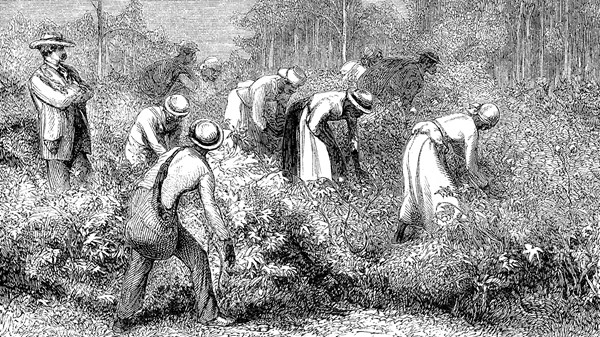Bible Team Challenge
Slavery: Morally Wrong or Perfectly Fine?
The age old question that has affected religion for years, still rings to this day. How did religions feel on the topic of slavery? Some religions argued for slavery, saying the Bible contained little evidence of being against slavery. Others, however, made claims to be against it. The research conducted was based on how all religions felt about the labor system of slavery, as a whole and how those views have changed over time.

Arguments for Slavery
The traditional religion of Christianity has felt and viewed slavery as acceptable. The first example of slavery being accepted is found in a novel by J Edgar Godspeed. In his writing he says that from the words of Paul, “You who are masters must treat your slaves justly, and fairly, and remember that you have a master, too, in heaven.” The quote from Paul does not explicitly denounce slavery. However it is viewed as acceptable, because he just says to treat enslaved people with respect.
The religious people of Christianity who are Caucasian were set in their ways making the argument that people who are against slavery known as abolitionists were going against God’s rule. According to the old distraction slur article “abolitionists as opponents of American salvation. It is sobering to realize that the greatest threat to abolition was not the 19th century version of alt-right White supremacists. It was those that were conversionists, the moderate White Christians.” However in the context stated above about White people being threats to abolition, it’s the opposite of how Black people in the 19th century thought. Black people of the 19th century have used the bible in anti-slavery arguments which stands as stated according to the old distraction slur article “and yet, Black thinkers, among others, have been challenging systemic racism from scripture for centuries.’’ There are several layers of irony, does God condone rape, and brutal treatment of others, does God condone lynchings and hangings, does God condone homicide? Questions that seem to be conveniently ignored when applying the bible to Christianity as a religion.
In closing, the above arguments have showed that the first hypothesis of all religions condoned slavery. The condoning of slavery has validated the support from a religious standpoint to benefit the slave owner. The religion of Christianity was accepting of slavery, because it could have been used for gaining financial mean.
“There is neither Jew nor Gentile, there is neither slave nor free, nor is there male and female, for you are all one in Christ Jesus”-Galatians 3:28
Arguments Against Slavery
In terms of the traditional religion of Christianity, there is evidence from the Bible itself that shows us that there was also condemnation of slavery occurring during this time. As a matter of fact, as shown in Galatians 3:28, “There is neither Jew nor Gentile, there is neither slave nor free, nor is there male and female, for you are all one in Christ Jesus”. The Christian faith, in some ways, did not believe in people being less or being equals, but rather that we all be one under our Lord Jesus Christ. Slavery goes against God’s intent for creation, in some ways, for his people, hence many harsh views against it.
In Genesis 9:6, we hear, “Whoever sheds human blood, by humans shall their blood be shed; for in the image of God has God made mankind”. While it is argued that this verse establishes the use and idea of capital punishment, this clearly displays the idea of treating others equally and fairly. Slavery was not something viewed as insignificant, but rather in the bible it was a big deal and a major topic of discussion. This becomes even more abundantly clear in Exodus 21:16. “Whoever steals a man and sells him, and anyone found in possession of him, shall be put to death”. This, therefore, would condemn the ideas of slavery.
Where Are We NOW?
At the beginning of the slave trade, beliefs were different all over the world. Generally speaking, when you take a look at the bible and its scripture, you can clearly see this for yourself. In Christianity slave holders could not call themselves Christian unless they wanted to be considered as those who sin. It was wrong, immoral and unjust. Over time, the different views on slavery led to an uproar in our nation over the emancipation of slaves. As time went on, people just became more educated, more informed and more passionate about the concept. While between religions, the definition of slavery did vary, it all led to and meant the same thing. It wasn’t until decades later that people found ways to make their own judgments and form opinions on slavery, which eventually led to the argument against slavery and the eventual emancipation of slaves.
In closing, the above arguments have showed that the first hypothesis of all religions condoning slavery at one point has checked out, and was true for the religion of Christianity at the time. The religion of Christianity was accepting of slavery, as they believed it was the rule of the Lord. Christianity was not, however, completely accepting and condoning slavery, rather they also found ways to condemn it. Finally, in closing research has shown that the religion of Christianity accepted slavery but also had arguments and views against it
Sources:
https://news.harvard.edu/gazette/story/2019/01/a-harvard-exhibit-on-slavery-and-christianity/
https://www.thirteen.org/wnet/slavery/experience/religion/history.html
No comments:
Post a Comment